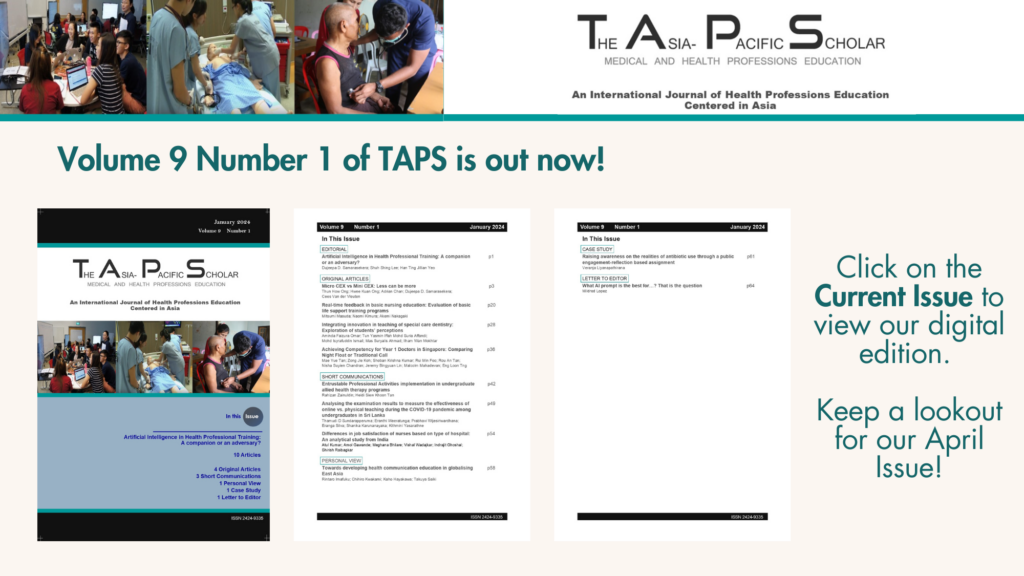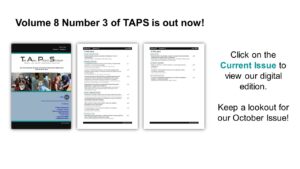In the midst of a pandemic, significant event analysis may protect the well-being of healthcare professionals
Submitted: 14 March 2023
Accepted: 31 March 2023
Published online: 3 October, TAPS 2023, 8(4), 57-58
https://doi.org/10.29060/TAPS.2023-8-4/LE3021
Tomoko Miyoshi1, Mikiko Iwatani2 & Fumio Otsuka1
1Department of General Medicine, Faculty of Medicine, Dentistry and Pharmaceutical Sciences, Okayama University, Japan; 2Department of Nursing, Okayama University Hospital, Japan
It was found that the excess mortality rate for U.S. physicians was considerably lower during the COVID-19 pandemic than in the general population, but more physicians died than expected when compared to pre-pandemic levels. These results suggest that appropriate infection control measures can reduce mortality; however, additional measures are needed.
During the COVID-19 pandemic, there have been many reports of burnout among healthcare professionals (HCPs). Although no causal relationship has been established, it is acknowledged that it would be difficult to pay attention to mental health issues and the creation of a healthy work environment during a pandemic.
Globally, the COVID-19 pandemic has subsided, but what have we learned from this COVID-19 pandemic?
We conducted six online significant event analyses (SEAs) in collaboration with facilities providing administrative support, nursing care, and medical care for COVID-19-infected individuals in March 2022. The participants were limited to HCPs and healthcare students. The presentations were based on actual cases of COVID-19-infected patients, focusing on the struggles of their positions and efforts to overcome them. Seventy-three people participated, and 38 responded to the post-event survey (52.1% response rate). Twenty respondents (52.6%) were satisfied, and 16 (42.1%) were very satisfied with this initiative, with gratitude for having the reflection.
SEA, a method of reflection, is a learning process in which recognition of one’s feelings is important (Henderson et al., 2002). HCPs are always considered to be engaged in reflective practices. However, during the COVID-19 pandemic, there were issues that were insufficient to transfer previous experiences. However, in the case of the COVID-19 pandemic, “reflection in action” was not sufficient to overcome the challenges, and the SEA may have served as a place for “reflection on action” to prepare for the next stage of the COVID-19 pandemic.
Furthermore, this SEA provided an opportunity to recognise the existence of “common humanity,” which is one of the three elements of self-compassion (the ability to understand that people other than oneself are also suffering). It is believed that, through the SEA, the HCPs were able to become aware of the feelings of other HCPs. It has been reported that increased self-compassion increases compassion for others (Neff & Germer, 2013), and the increased self-compassion of HCPs may increase their compassion for other HCPs and patients.
In the COVID-19 pandemic, reflection among healthcare providers beyond the facility may enhance self-compassion and compassion for others in preparation for the next pandemic, which may lead to HCPs’ well-being.
Notes on Contributors
T Miyoshi conceptualised and wrote the manuscript and approved the final version.
M Iwatani conceptualised and approved the manuscript.
F Otsuka supervised and edited the manuscript.
Funding
There is no funding provided.
Declaration of Interest
There is no conflict of interest, including financial, consultant, institutional or otherwise for the author.
References
Henderson, E., Berlin, A., Freeman, G., & Fuller, J. (2002). Twelve tips for promoting significant event analysis to enhance reflection in undergraduate medical students. Medical Teacher, 24(2),121–124. https://doi.org/10.1080/01421590220125240
Neff, K. D., & Germer, C. K. (2013). A pilot study and randomized controlled trial of the mindful self-compassion program. Journal of Clinical Psychology. 69(1), 28–44. https://doi.org/10.1002/jclp.21923
*Tomoko Miyoshi
2-5-1 Shikata-cho, Kita-ku
Okayama, 700-8558, Japan
+81-86-235-7342
Email: tmiyoshi@md.okayama-u.ac.jp











